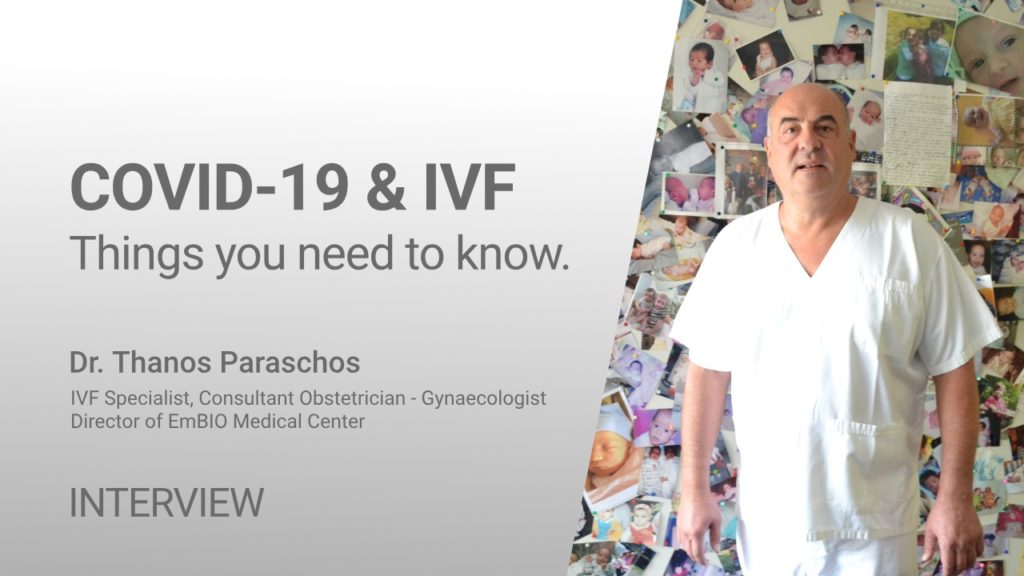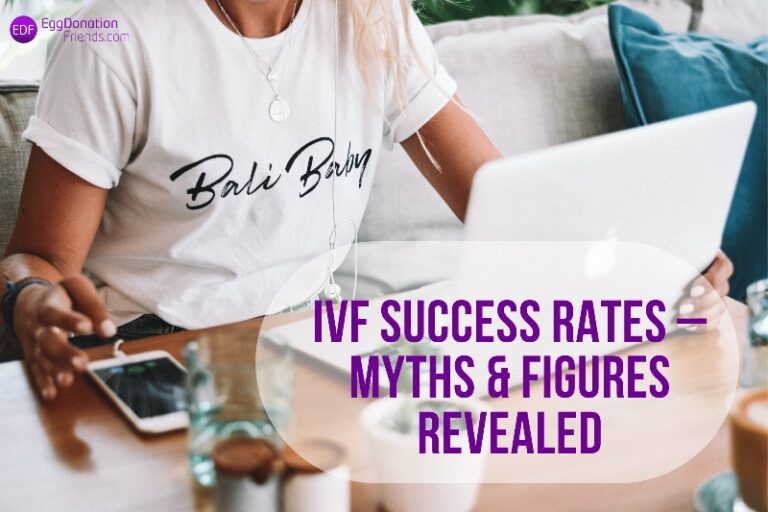Table of Contents
- 1 COVID-19 things you should know
- 1.1 What is your recommendation for patients who are thinking about starting IVF treatment? What’s the best option for them?
- 1.2 What about patients who are at the age of 49 – and have not much time to start treatment in some countries because of the age limit?
- 1.3 How can COVID-19 influence patients’ treatment and the effectiveness of the future treatment?
- 1.4 What effect can COVID-19 have on pregnancy?
- 1.5 I got my embryos frozen at the clinic because my cycle has been canceled/postponed. Is there any difference in success rates transferring frozen vs. fresh embryos?
- 1.6 How can patients prepare for IVF now during the quarantine?
- 1.7 Patients are asking about COVID-19, donors and recipients – can the virus be transmitted to the egg recipient if the donor was a carrier or infected?
- 1.8 How this situation may influence the availability of donors as today probably it’s more difficult to qualify the donor because of COVID-19?
This time we are talking to dr. Thanos Paraschos, IVF Specialist, Consultant Obstetrician – Gynaecologist, Director of EmBIO Medical Center from Greece.
COVID-19 things you should know
What is your recommendation for patients who are thinking about starting IVF treatment? What’s the best option for them?
Our clinic is following the guidance of ESHRE. ESHRE advises that assisted reproduction treatments should not be started at present mainly to avoid potential SARS-CoV-2 related complications during pregnancy and also to support the recommendations of social distancing. Pregnant women are considered high risk if they do contract the virus so our goal is the health and safety of our patients.
Patients are also advised not to pursue fertility tourism due to the strict travel bans in place. Still, you can make the most of your time during the quarantine and prepare for your IVF in order to start when this is sorted out.
For those patients who have already started assisted reproduction treatment, elective oocyte or embryo freezing for later embryo transfer (freeze-all) is recommended. The use of mild stimulation, GnRH antagonist control of the luteinizing hormone (LH) surge and GnRH agonist triggering are the first choice in this period.
What about patients who are at the age of 49 – and have not much time to start treatment in some countries because of the age limit?
There are no easy answers when it comes to situations like this. According to the updated statement from ESHRE (2-4-2020), in cases of urgent fertility preservation (e.g. in oncology patients) the cryopreservation of gametes, embryos or tissue should still be considered. Different approaches exist among treatment centers and countries, I am sure this can be negotiated in emergency situations and where delay would be detrimental to the prospects of patients.
How can COVID-19 influence patients’ treatment and the effectiveness of the future treatment?
The situation is highly fluid. During the coronavirus (COVID-19) pandemic it is suggested to all fertility patients considering treatment to defer pregnancy even if they do not meet the diagnostic criteria for COVID-19 infection. When services are able to recommence, things are expected to go back to normal. Priority should be given to patients whose treatment has been disrupted or deferred.
What effect can COVID-19 have on pregnancy?
It seems that COVID is not like the Zika virus and is probably OK if you’re pregnant, but we don’t have enough data. According to the RCOG, pregnant women are considered a vulnerable group. Recent updates on pregnancy outcomes in infected mothers report healthy infants, however, there are small case series reporting adverse outcomes, such as premature rupture of membranes and preterm delivery.
- Neonatal SARS-CoV-2 infection (five cases) and the presence of IgM (and IgG) antibodies against the virus in newborns (three cases) have also been reported.
- It is unclear whether these data are indicative of vertical transmission of SARS-CoV-2.
- Despite the fact that the data on pregnancy outcomes is reassuring, only small numbers of patients are available that the data must be interpreted with caution. Also, reports mainly refer to infection in the third trimester. There is no real information on the possible effect of SARS-CoV-2 infection on pregnancies in their initial stages.
I got my embryos frozen at the clinic because my cycle has been canceled/postponed. Is there any difference in success rates transferring frozen vs. fresh embryos?
Previous studies have shown a significant increase in pregnancy rates and live birth rates (LBRs) and a marked decrease in the risk of OHSS and perinatal and maternal morbidity with a freeze-all strategy. Even prior to the SARS-CoV-2 era, there has been a trend toward the adoption of the freeze-all strategy. The significantly increased pregnancy rates and LBRs with the adoption of a freeze-all strategy is attributed to avoiding exposure to the supra-physiological hormonal levels following Controlled Ovarian Stimulation, which can have a detrimental effect on embryos and placentation. Also, freezing all the embryos can better synchronize the endometrium and embryos.
How can patients prepare for IVF now during the quarantine?
We feel that this is a very difficult and trying time for our patients. Our clinic is available to provide clinical advice to all patients via online consultation. We are happy to review their records and answer all their questions. Patients can call in for telemedicine consultations with the doctor to discuss future plans. We make a point of keeping patients informed of changes to the service and the reasons for these, the effect of delay on their chances of success and the length of delay.
Patients are asking about COVID-19, donors and recipients – can the virus be transmitted to the egg recipient if the donor was a carrier or infected?
According to ESHRE, the risk of viral contamination to eggs or sperm or embryos in the IVF laboratory, either from egg donors or professionals, is minimal (if at all). This due to the repeated washing steps required for the culture and freezing protocols. This will result in a high dilution of any possible contaminants.
Sperm, oocytes and embryos do not have receptors for SARS-CoV-2 and are unlikely to be infected. Also, the zona pellucida represents a high level of protection for oocytes and embryos.
How this situation may influence the availability of donors as today probably it’s more difficult to qualify the donor because of COVID-19?
Before being accepted for EmBIO’s Donor Egg IVF Program, all donors will be tested for COVID-19. All donors will also be interviewed regarding the presence of respiratory symptoms and for recent travel to high-risk areas. For donors who have returned from an area at risk, a 2-week suspension will be required, and in the case of respiratory symptoms, a 2-week suspension from the end of symptoms will be necessitated. The egg donors are routinely examined extensively anyway to rule out infectious, mental and genetic diseases, including cystic fibrosis, sickle cell anaemia and thalassemia. They have had full genetic screening (all donors need to go through it according to the Greek legislation). Egg recipients have full access to our donors’ medical history.





